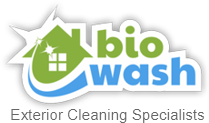Softwashing is the process of cleaning exterior surfaces to remove organic growth such as algae and lychen using low pressure cleaning solutions. This process is a much better alternative to regular jet or pressure washing for treating and removing surface algae as it actually kills the algae itself and keeps combatting the growth after the treatment has finished.
Special low-pressure nozzles are used on a telescopic lance which sprays the surface evenly with minimal surface run-off. A biodegradable chemical is mixed at a ratio sufficient for treating the biological elements (algae, mold, pollen, dirt, moss) and other stains without damaging surfaces on your home or killing your plants.
A surfactant is also mixed through the treatment which helps the treatment stick to the surface so it has time to attack and kill the surface algae effectively and efficiently.
Each surface to be cleaned needs to be individually assessed to determine the type of biological growth that is present before deciding on the correct type of treatment required. A personalised batch of cleaning solution is then mixed and applied to the surface. This can be sprayed on or in some cases a soft bristled brush is used to agitate the solution into the surface which will assist the cleaning process depending on the severity of the surface algae.
The treatment is left to work and treat the algae and is then rinsed down with clean water to remove any surface residue.
What Type of Surfaces is Softwashing Effective on?
- Render / K-Rend
- Traditional Pebbledash / Rough-cast / Textured Finishes
- Bricks
- Concrete
- Natural Stone Walls and Paving
- Fascia, Soffit Gutters & PVC Cladding
- Wooden Fencing and Decking
- Slated and Tiled Roofs
- Garden Furniture
Why Softwashing?
In most cases it is a better alternative to pressure/jet washing.
Pressure washing can erode and leave lasting damage to the surface of render which is very difficult to repair whereas softwashing is a more passive non-aggressive cleaning solution which poses no risk of damaging the surface itself when performed by our trained applicators.
Softwashing Actually Treats The Problem
The majority of homes or buildings aren’t “dirty”, they’re basically contaminated with one of the three very common forms of algae prominent here in the northwest of Ireland. Traditional pressure washing can remove the surface layer of this growth but it doesn’t actually fix the root of the issue and the algae will continue growing again as soon as the power washing is finished.
A proper softwash treatment using the correct environmentally friendly treatment solution mixed specifically for the type of algae present will agitate the algae and get to the actual root of the problem. A softwash continues to work and kill the algae long after the treatment has been applied and even though the results are often excellent immediately after the initial application, in many cases the surface will continue to appear noticeably brighter and clearer in the days and weeks afterwards.
The residual biocide film that is left on the surface afterwards also provides a lasting barrier to help prevent the surface algae reappearing.
Eco-friendly
Pressure washers utilize from 3 to 8 gallons of water per minute (gpm). In one hour of cleaning a pressure washer can use from 180 gallons upwards to 480 gallons of water. Conversely, soft washing just applies approximately 60 gallons of cleaning solution, which is made up of about 40 gallons of water.
The cleaning solution is so effective that it lasts 4 – 6 times longer than pressure washing. Making it more viable for the environment and your wallet.
